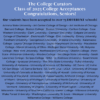
As the college application process evolves each cycle, some things remain the same. To be a competitive applicant, students need to have grades and scores within the range published by their target universities, and they need to have participated in extracurricular activities.
Year after year, we see students who meet with their college advisors junior year, only to realize that their activities are insufficient or do not tell a cohesive story. This in turn, ignites a frenzy, as the students seek to demonstrate involvement in activities outside the classroom. Inevitably, these last-ditch efforts fall flat. For one, they are inauthentic and, exactly as they appear, desperate efforts to make themselves look involved. Two, they lack the depth and commitment of an activity pursued in earnest over 4 years of high school. Three, they are devoid of real passion. Though admittedly, passion is such an overused, wrongly-applied word, with respect to students. Honestly, how many kids truly have a passion, beyond cookies and playtime, that began when they were five without some calculation on their parents’ part. At 50, I have yet to find my passion. Passion is a misnomer. I prefer, instead, to describe desirable activities performed outside the classroom as meaningful, committed, and verifiable.
Each student should attempt, beginning early on in their high school career, to immerse themselves in an activity that is meaningful to him/her or at least requires extensive commitment. This does not mean that the activity needs to be a varsity sport or the robotics team, nor does the student have to love it, but they should stick to it. The activities can be work, helping care for an elderly grandparent, or debate. The activity should be something that is hard, requires perseverance, and causes the student to make sacrifices, socially, emotionally, academically. The activity should challenge the student and teach life lessons. Meaningful activities should cost the student something, not financially, but internally, and allow him/her to experience failure. The trend today is for everyone to start a charity or a “for purpose business.” Colleges see right through these efforts as mere fabrications, unless they are generated from a sincere interest or concern. A meaningful activity needs to be something in which the student is vested, and dare I say, causes a little bit of pain. For many students, life is hard enough and provides ample opportunities to test resilience. For the lucky ones, who have not faced real-life challenges, they must find other ways to test themselves, as a waitress dealing with unhappy diners, caring for a sibling while a parent works, the relentless demands of school newspaper deadlines, criticisms from an uncompromising coach, or volunteering at a suicide hotline, to name a few. All of these activities are meaningful, because they force the student to work under pressure, develop fortitude and grit, and grow. Activities should also be verifiable. Knitting alone in your room might produce masterpieces, but if no one sees them, it’s “the tree falling in the forest.” Today, it so easy to create a virtual gallery of your work, to share your passion with the world. These meaningful activities have the side benefit of teaching new skills and forging the student into an interesting person.
The significance is not to build an impressive resume, but to show the admissions office that the student can handle life challenges on top of academics, so that when they arrive on campus, they are armed with the experiences to manage the demands of being a college student and a productive member of the community.






